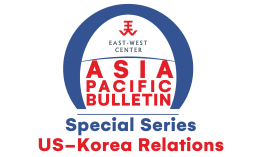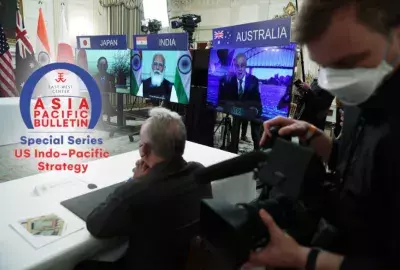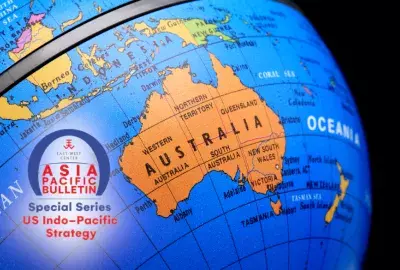Error message

|
Ambassador (ret) Kathleen Stephens, US ambassador to the Republic of Korea from 2008 to 2011 and President of the Korea Economic Institute of America (KEI), & Mr. Andy Hong, Program Officer at KEI, explain that "young Koreans cast the key swing votes" in Korea's March 9 presidential election and that "[t]raditional approaches... to the US-ROK alliance, relations with China and Japan, and inter-Korean policy carry less salience for this new cohort of voters." |
The March 9 presidential election in South Korea, also known as the Republic of Korea (ROK), was a closely fought contest in which young Koreans in their 20s and 30s cast the key swing votes. For this constituency focused on opportunity, fairness, economic discontent, and a politicized gender divide, foreign policy was a secondary focus. Traditional approaches, both conservative and progressive, to the US-ROK alliance, relations with China and Japan, and inter-Korean policy carry less salience for this new cohort of voters.
The life experiences of these young Koreans inform why their views are different from those of earlier generations: Koreans in their 20s and 30s represent the first generation born in a developed, democratized South Korea. They grew up in an era of expanding civil and political liberty and increasing international prestige, but also intense competition, stagnating social and economic mobility, and growing inequality. Their changing attitudes could affect US-Korea relations on such issues as the notion of strategic ambiguity, Korea’s place in US-led multilateral frameworks, and transfer of wartime operational control (OPCON) of a combined US–South Korean force to a Korean command.
OPCON Transfer and the US-ROK Military Alliance
Edging out a win in the 2022 election, the conservative candidate Yoon Suk Yeol benefitted from changing generational perceptions of US-Korean security relations, particularly in the context of heightened geopolitical tensions due to worsening US-China relations and Russia’s invasion of Ukraine.
US wartime OPCON of allied forces on the Korean Peninsula has long been a politicized issue in South Korea. Several past administrations have regarded the transfer of OPCON to Korean command as a matter of national pride or sovereignty, including the outgoing President Moon Jae-in.
But a growing number of Koreans—including many young voters—do not attach such symbolic weight to OPCON transfer. South Korea’s rising profile in the international stage corresponds with rising confidence, along with increasing ROK military budgets and capabilities. Ensuring US commitment in a time of rising geopolitical tensions and worries about the implications of a revived “America First” approach to policy may also lessen the political pressure on the Yoon administration to move faster than a cautious “conditions-based” scenario.
Korean Strategic Ambiguity
Some observers, particularly in the United States, have characterized the election of Yoon Suk Yeol as a decisive watershed in moving away from South Korean “strategic ambiguity.” In fact, younger Koreans seem have been shifting toward “strategic clarity” for some time.
The conservative People Power Party (PPP) rhetoric of siding with the United States in the US-China rivalry resonated with younger voters in their 20s and 30s, who are more critical of China and North Korea than previous generations. This posture partly stems from the younger generation’s identification with Korea’s democratic consolidation since 1987. With a worldview cultivated in this environment, young Koreans saw China’s suppression of protests in Hong Kong, for example, as a demonstration of authoritarianism inconsistent with their values.
Many of these voters find the United States and Japan more relatable societies that share South Korea’s democratic ideals. Many young Koreans cynically compare North Korean leader Kim Jong Un to the now-third generation of heirs to South Korea’s chaebols, suggesting that in both systems nepotism trumps talent and hard work.
These attitudes played to Yoon and the PPP’s platform of strengthening the ROK-US alliance, improving Korea’s relationship with Japan, and emphasizing toughness on North Korea. The younger Korean generation may see this values-based approach as more consistent with the priority they place in democracy and human rights.
Korea’s Place in the Region
The youth’s values-based foreign policy positions also carry implications for South Korea’s place in the region and the global community. On the campaign trail, President-elect Yoon emphasized reconciliation with Tokyo—a relationship increasingly strained in recent years. Support for improving Korea-Japan relations, and public discomfort with the level of current tensions, comes from an understanding that good bilateral Seoul-Tokyo ties are essential to addressing China’s assertiveness.
Although Seoul’s bilateral relations with Washington remain strong and those between Tokyo are projected to improve, South Korea’s place in multilateral security arrangements such as the Quad remains nuanced. The Yoon administration is leaning forward on the Quad, but still approaching it with caution, given the need to manage its relationship with Beijing. More generally, the younger generation’s support, at least in principle, for a values-based foreign policy could create greater space for South Korean engagement with groups of “like-minded” partners.
An impressive and important trend in South Korea’s foreign policy has been the bipartisan support for overseas development assistance (ODA). While affected by the COVID-19 pandemic, South Korea continued to be an active contributor in ODA, including through dedicated aid institutions like the Korea International Cooperation Agency (KOICA). Reflecting this longstanding respect and support for South Korea as a foreign aid provider, President-elect Yoon has repeatedly expressed his intent to expand its ODA programs to cement Seoul’s place in the region as an active contributor to global development.
Long-time watchers of South Korea point to regionalism and ideology as principal drivers of politics, including a sharp divide between “conservative” and “progressive” positions as defined in the Korean context. While those factors are still at play, their salience and strength are shifting. The 2022 Presidential election was notable for the role played by the new generation and gender divisions in the electorate. The worldview and values of South Koreans born around the beginning of the 21st century, who are not so attached to the outlook of their elders, are beginning to come into view—if not always coherently. It bears watching.

|
Ambassador (ret) Kathleen Stephens, US ambassador to the Republic of Korea from 2008 to 2011 and President of the Korea Economic Institute of America (KEI), & Mr. Andy Hong, Program Officer at KEI, explain that "young Koreans cast the key swing votes" in Korea's March 9 presidential election and that "[t]raditional approaches... to the US-ROK alliance, relations with China and Japan, and inter-Korean policy carry less salience for this new cohort of voters." |
The March 9 presidential election in South Korea, also known as the Republic of Korea (ROK), was a closely fought contest in which young Koreans in their 20s and 30s cast the key swing votes. For this constituency focused on opportunity, fairness, economic discontent, and a politicized gender divide, foreign policy was a secondary focus. Traditional approaches, both conservative and progressive, to the US-ROK alliance, relations with China and Japan, and inter-Korean policy carry less salience for this new cohort of voters.
The life experiences of these young Koreans inform why their views are different from those of earlier generations: Koreans in their 20s and 30s represent the first generation born in a developed, democratized South Korea. They grew up in an era of expanding civil and political liberty and increasing international prestige, but also intense competition, stagnating social and economic mobility, and growing inequality. Their changing attitudes could affect US-Korea relations on such issues as the notion of strategic ambiguity, Korea’s place in US-led multilateral frameworks, and transfer of wartime operational control (OPCON) of a combined US–South Korean force to a Korean command.
OPCON Transfer and the US-ROK Military Alliance
Edging out a win in the 2022 election, the conservative candidate Yoon Suk Yeol benefitted from changing generational perceptions of US-Korean security relations, particularly in the context of heightened geopolitical tensions due to worsening US-China relations and Russia’s invasion of Ukraine.
US wartime OPCON of allied forces on the Korean Peninsula has long been a politicized issue in South Korea. Several past administrations have regarded the transfer of OPCON to Korean command as a matter of national pride or sovereignty, including the outgoing President Moon Jae-in.
But a growing number of Koreans—including many young voters—do not attach such symbolic weight to OPCON transfer. South Korea’s rising profile in the international stage corresponds with rising confidence, along with increasing ROK military budgets and capabilities. Ensuring US commitment in a time of rising geopolitical tensions and worries about the implications of a revived “America First” approach to policy may also lessen the political pressure on the Yoon administration to move faster than a cautious “conditions-based” scenario.
Korean Strategic Ambiguity
Some observers, particularly in the United States, have characterized the election of Yoon Suk Yeol as a decisive watershed in moving away from South Korean “strategic ambiguity.” In fact, younger Koreans seem have been shifting toward “strategic clarity” for some time.
The conservative People Power Party (PPP) rhetoric of siding with the United States in the US-China rivalry resonated with younger voters in their 20s and 30s, who are more critical of China and North Korea than previous generations. This posture partly stems from the younger generation’s identification with Korea’s democratic consolidation since 1987. With a worldview cultivated in this environment, young Koreans saw China’s suppression of protests in Hong Kong, for example, as a demonstration of authoritarianism inconsistent with their values.
Many of these voters find the United States and Japan more relatable societies that share South Korea’s democratic ideals. Many young Koreans cynically compare North Korean leader Kim Jong Un to the now-third generation of heirs to South Korea’s chaebols, suggesting that in both systems nepotism trumps talent and hard work.
These attitudes played to Yoon and the PPP’s platform of strengthening the ROK-US alliance, improving Korea’s relationship with Japan, and emphasizing toughness on North Korea. The younger Korean generation may see this values-based approach as more consistent with the priority they place in democracy and human rights.
Korea’s Place in the Region
The youth’s values-based foreign policy positions also carry implications for South Korea’s place in the region and the global community. On the campaign trail, President-elect Yoon emphasized reconciliation with Tokyo—a relationship increasingly strained in recent years. Support for improving Korea-Japan relations, and public discomfort with the level of current tensions, comes from an understanding that good bilateral Seoul-Tokyo ties are essential to addressing China’s assertiveness.
Although Seoul’s bilateral relations with Washington remain strong and those between Tokyo are projected to improve, South Korea’s place in multilateral security arrangements such as the Quad remains nuanced. The Yoon administration is leaning forward on the Quad, but still approaching it with caution, given the need to manage its relationship with Beijing. More generally, the younger generation’s support, at least in principle, for a values-based foreign policy could create greater space for South Korean engagement with groups of “like-minded” partners.
An impressive and important trend in South Korea’s foreign policy has been the bipartisan support for overseas development assistance (ODA). While affected by the COVID-19 pandemic, South Korea continued to be an active contributor in ODA, including through dedicated aid institutions like the Korea International Cooperation Agency (KOICA). Reflecting this longstanding respect and support for South Korea as a foreign aid provider, President-elect Yoon has repeatedly expressed his intent to expand its ODA programs to cement Seoul’s place in the region as an active contributor to global development.
Long-time watchers of South Korea point to regionalism and ideology as principal drivers of politics, including a sharp divide between “conservative” and “progressive” positions as defined in the Korean context. While those factors are still at play, their salience and strength are shifting. The 2022 Presidential election was notable for the role played by the new generation and gender divisions in the electorate. The worldview and values of South Koreans born around the beginning of the 21st century, who are not so attached to the outlook of their elders, are beginning to come into view—if not always coherently. It bears watching.







